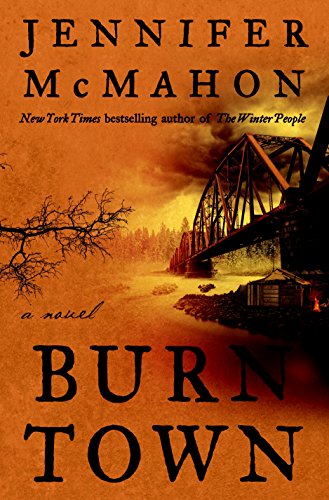
Chapter 3 Excerpt: Burntown

Below is the third chapter of Burntown by Jennifer McMahon, out April 25th!
✦ Read the previous chapters here: Ch 1 | Ch2 ✦
✦ Pre-order Now: Amazon | Barnes & Noble | IndieBound | iBooks ✦
BURNTOWN by Jennifer McMahon – Chapter 3
MILES
October 31, 2000
Halloween. A day for spooks and the spooky. And the day, he’s heard Lily say, when the veil between the worlds is thin. “Ghosts walk on Halloween,” his wife told him once with such surety that of course he believed. Which makes today the perfect day for turning on the invention.
Lily made little Eva a ladybug costume: a red fleece suit with wings and black felt dots sewn on. She’s taken her to the children’s Halloween parade downtown. Afterward, there’s a party at the library with games, a magician, apple bobbing.
So Lily and little three-year old Ladybug Eva are off to see the world of parades full of Barneys, princesses, and pirates. They’ll bob for apples with vampires and ghosts. And it gives Miles the whole afternoon and evening to test the machine.
About six months ago, Miles and Lily bought an old farmhouse out at the end of Birchwood Lane, a winding, dead-end dirt road that runs along the east side of the river. It’s a thirty-five minute commute to the college, but Lily could no longer stand to stay in downtown Ashford, where you could smell the sulfur smoke from the paper mill and see the poisoned film on the two rivers, which people said you shouldn’t swim in either unless you wanted to grow extra fingers. They’re full of toxic sludge, ruined from the decades of chemicals and dyes and dioxins that have been dumped by the mills. The Jensen Mill, machine shop and foundry have been closed forever — Two Rivers College, where Miles has studied and now teaches, is housed in the old foundry building — but there’s a paper company that still runs, still stinks. The EPA has cracked down, so they’re not dumping as many chemicals into the river these days. They’re putting their waste in barrels that are carted away and become some other town’s problem. Lily said she didn’t care — Ashford was filthy and full of poisons. She wanted to be out in the country in a house with a yard and gardens and space for little Eva to play. Miles built her a sandbox. Put up a swingset. His little girl could spend hours swinging.
Miles is in his workshop now, a little aluminum-walled garden shed in the backyard, puffing on his pipe (a joke gift from Lily in honor of his first teaching position). He looks at the brass elephant, which he’s given a new home by a favorite photo of his mother. In it, she’s on the couch holding a book, and the photographer (his father) has caught her by surprise. She’s smiling, but slightly startled, her mouth open.
Miles is writing his PhD dissertation about the little brass elephant; not the elephant exactly, but the ideas inspired by the elephant and the story his mother once told him. The Princess and the Elephant: a sociological study of how personal and cultural stories and myths shape individuals and society.
Miles lets himself believe, at times, that some piece of his mother is trapped inside the charm, as with the princess trapped inside the body of the elephant in the story. He strokes its tiny brass back, the curve of its trunk, remembering how many times he’d stared at it wishing that it would tell him what he wanted to hear.
But now maybe, just maybe, he’s found something that might. It’s Halloween, after all. What better day for a conversation with the dead?
He looks down at the machine laid out on his table: tubes and wires, coils and capacitors, pieces scavenged from old radios or bought from eBay. He has spent the past four months building Thomas Edison’s secret machine,. He has worked in his shed with the door locked and the plans spread out before him, telling no one what he was doing. When Lily asks, he tells her he’s just tinkering: building more mechanical animals like the wind-up metal raccoon she loves so much. He’s thought of telling Lloyd, of showing him the plans and asking for help, but this is something he needs to do on his own.
He knows what his friends and colleagues at the college would think if they could see him now. He’d be out of a job, probably. “You can’t be serious, Miles,” they would say. “You can’t possibly think such a thing would work.”
But, he would argue. Say, “If you had plans believed to truly be from a secret machine of Thomas Edison’s, wouldn’t you build them? Wouldn’t you want to see for yourself?”
Now, he’s just making adjustments, fine-tuning things. But really, there’s nothing left to fine-tune. The machine is a near perfect replication of the one drawn in the plans. It has taken months of trial and error to get to this point, but now, at last, everything looks perfect. So what he’s really doing as he tightens tubes, rechecks connections, is stalling. He’s not sure what he’s more afraid of — that it won’t work (which is, his rational mind tells him, the most probably result)? Or that it will?
And what if it does work and actually gets through to her?
He’s run through it a millions times in his mind. How he’ll finally say what he’s waited all these years to tell her:
I’m sorry.
I’m so sorry I couldn’t save you.
He closes his eyes and he’s a ten-year-old boy again, dressed up as Robin Hood, feeling the arrow leave the bow, the red feathers brushing against his right cheek, watching it go right into the back of the Chicken Man.
He touches the elephant one more time for luck, flips the on switch, watches the machine glow. He adjusts knobs, turns the volume all the way up. He hears the dull crackle of static; the way you do when you’re between radio stations. Then, he takes the hand-held receiver and speaks into it.
“Hello,” he says tentatively.
The crackling changes, he thinks he hears something behind it: voices, people talking, calling, laughing from far away, as if at a distant party.
“Hello,” he says, louder this time. “Anybody there? Can you hear me?”
It feels idiotic, pathetic, even: a grown man talking into a cobbled together radio, hoping for a response.
“Elizabeth Sandeski?” he says, voice tentative. “Are you there?”
All he hears is his own heartbeat. Then, a crackling from the speaker.
She’s here, a male voice says, clearly. We’re all here.
Miles flinches back, nearly drops the receiver. Then, from the machine, he hears someone saying his name.
“Mother?” he says, fearful. “Are you there?”
Yes, a voice comes back, louder and female, swimming through waves of electrical interference. It’s a voice he recognizes. A voice he’s heard in his dreams.
His heart jolts, and what he says next isn’t what he’s planned for and rehearsed, but it’s what he most needs to know.
“Who is he, Mother?” Miles says into the machine. “Who murdered you?”
A dull roar of static.
“Please,” he says.
And then, in a crackling whisper, she tells him.
“No,” he says, voice trembling, stomach churning. “That’s not possible.”
She repeats the name, and then, she’s gone. He fiddles with the knobs, calls for her again and again, but there’s only static.
And he knows what he must do.
He turns off the machine, covers it up with a tarp, and, hands and legs shaking, goes to find the man who killed his mother.
✦ Come back to Vilma’s Book Blog tomorrow to read the fourth chapter!!! ✦
About Jennifer
 I was born in 1968 and grew up in my grandmother’s house in suburban Connecticut, where I was convinced a ghost named Virgil lived in the attic. I wrote my first short story in third grade. I graduated with a BA from Goddard College in 1991 and then studied poetry for a year in the MFA in Writing Program at Vermont College. A poem turned into a story, which turned into a novel, and I decided to take some time to think about whether I wanted to write poetry or fiction. After bouncing around the country, I wound up back in Vermont, living in a cabin with no electricity, running water, or phone with my partner, Drea, while we built our own house.
I was born in 1968 and grew up in my grandmother’s house in suburban Connecticut, where I was convinced a ghost named Virgil lived in the attic. I wrote my first short story in third grade. I graduated with a BA from Goddard College in 1991 and then studied poetry for a year in the MFA in Writing Program at Vermont College. A poem turned into a story, which turned into a novel, and I decided to take some time to think about whether I wanted to write poetry or fiction. After bouncing around the country, I wound up back in Vermont, living in a cabin with no electricity, running water, or phone with my partner, Drea, while we built our own house.
Over the years, I have been a house painter, farm worker, paste-up artist, Easter Bunny, pizza delivery person, homeless shelter staff member, and counselor for adults and kids with mental illness — I quit my last real job in 2000 to work on writing full time. In 2004, I gave birth to our daughter, Zella. These days, we’re living in an old Victorian in Montpelier, Vermont. Some neighbors think it looks like the Addams family house, which brings me immense pleasure.
✦ ✦ ✦ ✦ ✦ ✦ ✦ ✦
Facebook | Twitter | Pinterest | Instagram | Goodreads | Shop my Instagram
Subscribe for Updates:














 by
by